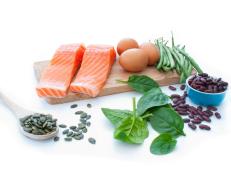Why You Need Iron

Charlotte Allen, Charlotte Allen
Iron is a mineral that’s a building block of proteins and enzymes. It’s essential for many functions, including moving oxygen around the body. Yet many people have iron deficiency. Find out what iron is, how much you need and why the right amount is important.
Iron is the most-abundant mineral on earth. In humans, 70 percent of iron is found in red blood cells as part of hemoglobin and in muscle cells as myoglobin. Hemoglobin shuttles oxygen around the body, whereas myoglobin receives the oxygen and brings it to energy-producing mitochondria.
There are two kinds of iron: heme and nonheme. Heme is more easily absorbed by the body, but it’s found only in animal foods, including meat, poultry and fish — it makes up about half of the iron in those foods; the other half is nonheme. Nonheme iron is also found in eggs and plant-based foods, including beans, dried fruits, some vegetables and fortified foods.
The recommended daily allowance is 8 milligrams per day for men and postmenopausal women, 18 milligrams per day for premenopausal women and 27 milligrams per day for pregnant women.
If you’re a vegetarian, the iron recommendations are 1.8 times higher, since the nonheme iron you get through vegetarian food sources is less bioavailable than heme iron.
Iron deficiency is the most-common nutrient deficiency worldwide. Children, menstruating and pregnant women and frequent blood donors are the most at risk for deficiency. Iron-deficiency anemia is characterized by fatigue, dizziness or lightheadedness and headaches.
It’s hard to get too much iron through food. Your body is good at regulating iron intake, and if you have enough iron, your body can block absorption of any more. However, taking supplemental iron could lead to overdose, which is why iron supplements are not recommended for older adults, whose iron needs are lower. Some groups of people are more susceptible to iron overload, including senior citizens and individuals with hereditary hemochromatosis, a condition that causes individuals to absorb more iron than the body needs.
Kerri-Ann Jenning is a registered dietitian who writes on food and health trends. Find more of her work at kerriannjennings.com or follow her on Twitter @kerriannrd or Facebook .


























